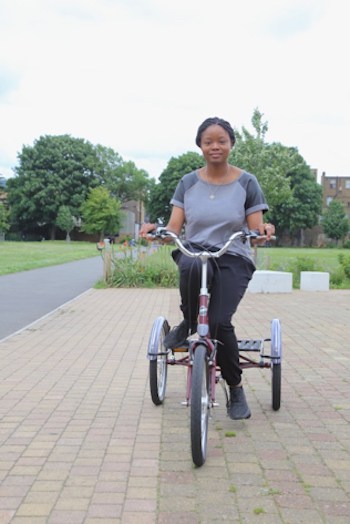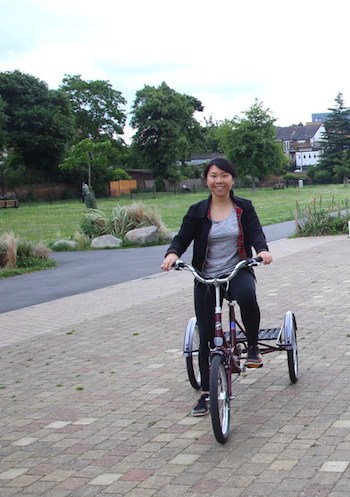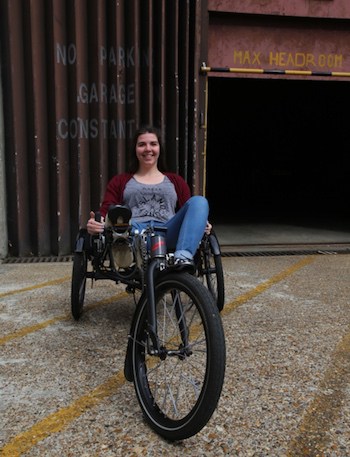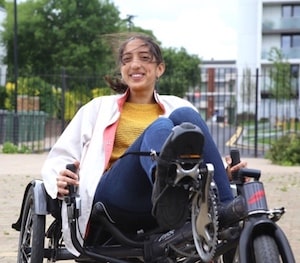In the lead up to our Beyond the Bicycle Conference, we are looking at some key issues and perspectives around inclusive cycling. This week we hear directly from four UCL volunteers about their experiences working with Wheels for Wellbeing.
Our Beyond the Bicycle Conference is taking place on Tuesday 7th November at City Hall, in Central London. Learn more and book on here.
UCL and Wheels for Wellbeing partnered to offer a team of undergraduate and post-graduate students interested in the voluntary sector a chance to work within the charity for two weeks this summer. During their placement, Monica, Mathilde, Amanda and Pippa attended an inclusive cycling session. The four eager volunteers were able to reflect on their experiences after their time with Wheels for Wellbeing and seeing the work we do within the community.
Pippa Carey
 Before the session at Ladywell Day Centre, I thought the only option for disabled riders were hand-powered cycles. But there, I saw people enjoying side-by side tandems, adult tricycles, recumbent cycles and wheelchair tandems, even a cycle that could accommodate a wheelchair. I was also able to try every cycle myself. It made me realize how narrow my perception of the phrase ‘disabled cyclist’ really was. There are so many other options that exist. At UCL, I study global health and development and one focus of the programme is learning how to identify the health needs within different populations. Over the past few weeks, I’ve come to see how important accessibility and inclusivity are to disabled cyclists, for health and wellbeing on top of the transport benefits. I’ve also been able to reflect on the barriers that exist, including finding a cycle that’s best suited for each individual’s needs, the cost of owning your own adapted cycle, the freedom to manoeuvre within a city’s built environment and access to having spaces to ride. For instance, one thing I never considered is how the width of cycle lanes can severely limit the types of cycles that can traverse the motorways. There is so much standing in between a person’s desire and their practical ability to ride. That’s why I’m so glad to have been placed at an organisation that is working so hard to raise awareness about the needs of disabled cyclists with local authorities and provide opportunities for disabled cyclists to get moving.
Before the session at Ladywell Day Centre, I thought the only option for disabled riders were hand-powered cycles. But there, I saw people enjoying side-by side tandems, adult tricycles, recumbent cycles and wheelchair tandems, even a cycle that could accommodate a wheelchair. I was also able to try every cycle myself. It made me realize how narrow my perception of the phrase ‘disabled cyclist’ really was. There are so many other options that exist. At UCL, I study global health and development and one focus of the programme is learning how to identify the health needs within different populations. Over the past few weeks, I’ve come to see how important accessibility and inclusivity are to disabled cyclists, for health and wellbeing on top of the transport benefits. I’ve also been able to reflect on the barriers that exist, including finding a cycle that’s best suited for each individual’s needs, the cost of owning your own adapted cycle, the freedom to manoeuvre within a city’s built environment and access to having spaces to ride. For instance, one thing I never considered is how the width of cycle lanes can severely limit the types of cycles that can traverse the motorways. There is so much standing in between a person’s desire and their practical ability to ride. That’s why I’m so glad to have been placed at an organisation that is working so hard to raise awareness about the needs of disabled cyclists with local authorities and provide opportunities for disabled cyclists to get moving.
Amanda Low
 Having been assigned a placement at Wheels for Wellbeing is really an amalgamation of my interests. I am currently reading anthropology at UCL, a discipline that takes on a broad perspective of understanding humanity. One of the central focuses of anthropology is to delve into local contexts and uncover the diverse realities of different individuals and communities. Getting involved with Wheels for Wellbeing brings to life the importance of paying attention to individuals and communities who might otherwise go unnoticed amongst the majority, and in turn be excluded. I am interested in how urban landscapes shape the health and well-being of a community. As an avid cyclist myself, I cycle to commute around my neighbourhood in London. My bicycle has provided me with the convenience and benefits of active commuting. London roads are not the friendliest for cyclists, and I can’t imagine it being any more accommodating for disabled people. My time thus far at Wheels for Wellbeing has allowed me to view the cycle with fresh eyes. It is amazing to see how reimagining a machine as a mobility aid can be so vital in creating inclusivity and empowering individuals who are otherwise disengaged from their communities and their environment.
Having been assigned a placement at Wheels for Wellbeing is really an amalgamation of my interests. I am currently reading anthropology at UCL, a discipline that takes on a broad perspective of understanding humanity. One of the central focuses of anthropology is to delve into local contexts and uncover the diverse realities of different individuals and communities. Getting involved with Wheels for Wellbeing brings to life the importance of paying attention to individuals and communities who might otherwise go unnoticed amongst the majority, and in turn be excluded. I am interested in how urban landscapes shape the health and well-being of a community. As an avid cyclist myself, I cycle to commute around my neighbourhood in London. My bicycle has provided me with the convenience and benefits of active commuting. London roads are not the friendliest for cyclists, and I can’t imagine it being any more accommodating for disabled people. My time thus far at Wheels for Wellbeing has allowed me to view the cycle with fresh eyes. It is amazing to see how reimagining a machine as a mobility aid can be so vital in creating inclusivity and empowering individuals who are otherwise disengaged from their communities and their environment.
Mathilde Clodic
 Being involved in Wheels for Wellbeing is more than an eye-opening placement, it is a fully human experience. Starting off witnessing the reality of the charity’s action and impact on the ground judging by the participants’ smile and laughter was the best possible way to understand its goals and work towards achieving them. As a social and political science student, I realised the lack of importance given to disabled people and minorities, often times forgotten when making laws hence the lack of inclusivity of infrastructure. Furthermore, Wheels for Wellbeing brings the community hope and concrete actions thanks to its network of professionals who can trigger change in key sectors. Contrary to what I thought, cycling does not boil down to a two wheeled bike but the field of possibilities is much more varied.
Being involved in Wheels for Wellbeing is more than an eye-opening placement, it is a fully human experience. Starting off witnessing the reality of the charity’s action and impact on the ground judging by the participants’ smile and laughter was the best possible way to understand its goals and work towards achieving them. As a social and political science student, I realised the lack of importance given to disabled people and minorities, often times forgotten when making laws hence the lack of inclusivity of infrastructure. Furthermore, Wheels for Wellbeing brings the community hope and concrete actions thanks to its network of professionals who can trigger change in key sectors. Contrary to what I thought, cycling does not boil down to a two wheeled bike but the field of possibilities is much more varied.
Before I discovered the universe of disabled cyclists, I thought cycling was either a hobby, a sport or a mode of transport but it really turns out they transformed it to achieve much more! It goes beyond physical abilities and also improves mental health, namely as a social activity. I acknowledged the harsh daily reality of urban life and the obstacles disabled people face on the road and the harm it entails. The journey towards equality isn’t over yet and this goes way beyond the bicycle or the disabled!
Monica Kulkarni
 Something I will really take away from my time with Wheels for Wellbeing is an understanding of the social model of disability. This concept was developed as a direct challenge to the medical model, which defines people as being disabled due to their impairment. For example, the medical model would say that having painful hands and not being able to open doors would make you disabled. The social model, however, would instead say that disability is caused by barriers created by society rather than the impairment. For the same example, the social model solution would be to design automatic doors, thus removing the barrier. I think this shifting of pressure from disabled people to society is powerful, and crucial for inclusive change. Working for Wheels for Wellbeing has opened my eyes to the fact that bikes are by no means just two wheeled. Although I live and study in London, I was oblivious to so many of the barriers that disabled cyclists face daily. Having to dismount the bike in no cycling zones, bike lanes which aren’t wide enough for trikes and dropped kerbs are some cycle-specific barriers. Having spoken to several disabled cyclists about their personal experiences cycling in London, I now realise how crucial Wheels for Wellbeing’s campaigning efforts are in bringing about change for more inclusive cycling.
Something I will really take away from my time with Wheels for Wellbeing is an understanding of the social model of disability. This concept was developed as a direct challenge to the medical model, which defines people as being disabled due to their impairment. For example, the medical model would say that having painful hands and not being able to open doors would make you disabled. The social model, however, would instead say that disability is caused by barriers created by society rather than the impairment. For the same example, the social model solution would be to design automatic doors, thus removing the barrier. I think this shifting of pressure from disabled people to society is powerful, and crucial for inclusive change. Working for Wheels for Wellbeing has opened my eyes to the fact that bikes are by no means just two wheeled. Although I live and study in London, I was oblivious to so many of the barriers that disabled cyclists face daily. Having to dismount the bike in no cycling zones, bike lanes which aren’t wide enough for trikes and dropped kerbs are some cycle-specific barriers. Having spoken to several disabled cyclists about their personal experiences cycling in London, I now realise how crucial Wheels for Wellbeing’s campaigning efforts are in bringing about change for more inclusive cycling.
